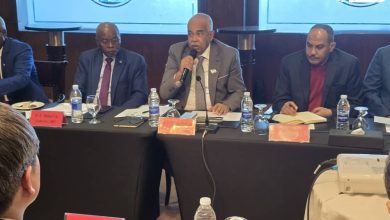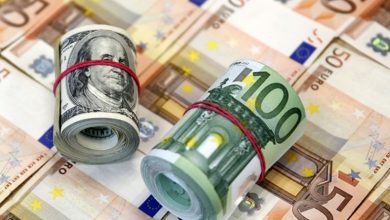Expert In Export Field: Mohamed Yahya draws a Roadmap to save the Economy

Strict security measures are needed to strike those manipulating foreign currency
Sudan Events-Interview – Nahid Oshi
Expert on the Export Mohamed Yahya drew a roadmap to get the economy out of the bottleneck, and called on the banking system to put in place strict and strict security measures aimed at striking those manipulating foreign currency and tightening penalties to include the punishment of terrorism and sabotaging the economy and national security, with the aim of slowing the deterioration as much as possible and achieving price stability. He said, ”
The State should develop urgent emergency plans to benefit from Sudan’s capabilities as a country that produces gold in large quantities, through which it is possible to build up estimated reserves that help the state in borrowing and obtaining financing.” The following is the text of his statements.
How can the fluctuation of the Sudanese pound exchange rate be addressed?
The rate of collapse of the national currency against free currencies has escalated during the past weeks, which requires the Central Bank CB and the National Intelligence and Security Service to take urgent measures to stop the rapid deterioration of the national currency as soon as possible.
In such situations , the State’s intervention plan lies in addressing the matter through many methods, including seeking grants, loans or assistance from a friendly country by depositing a deposit in the Central Bank CB that contributes to alleviating the severity of the crisis, as happened to one of the neighboring countries where the price of the national currency collapsed to a significant level had it not been for the financial assistance in the form of a bank deposit provided by the countries of Saudi Arabia and the Emirates to that country.
In Sudan, the sisterly State of Qatar affirmed its support to the Sudanese government by entering investments and deposits in the near future, which will contribute to alleviating the deterioration of economic indicators from the exchange rate and the decline in prices and moving the wheel of the economy.
Are deposits alone enough to stabilize the exchange rate?
In parallel with the entry of this deposit into the banking system, strict and strict security interventions and procedures can be carried out to strike those manipulating foreign currency and tighten penalties to the point of terrorism and sabotaging the economy and national security in order to slow the deterioration as much as possible and stabilize prices, while developing urgent emergency plans to benefit from Sudan’s capabilities as a country that produces gold in large quantities, through which this sector can form significant reserves that help the state borrow and obtain financing. Perhaps the justifications for focusing on security measures come according to recent research evidence affirmed by experts that the percentage of non-economic factors contributing to the deterioration of the Sudanese pound through speculation and rumors represents about 60% of the value of the Sudanese pound exchange rate, which has exceeded 2,300 since mid-July of this year 2024 and approached the threshold of SDGs 3,000 per dollar.
This affirms that the deterioration of the exchange rate is fabricated?
Certainly, the witness is that the continued deterioration in this way is not for real reasons related to the national economy or the effects of the current war, but rather for fabricated reasons that are not devoid of deliberate sabotage. Therefore, strict security measures are necessary because the continued acceleration of the deterioration generates more speculation and loss of confidence in the national currency.
In the context of preventing the erosion of wealth from local currencies, investors and citizens resort to hoarding the largest amount of gold and hard currencies as a safe haven so as not to lose more of their savings and capital that has been eroded.
Here, it is worth noting that the security measures in this regard are not a radical treatment in themselves, but rather a mechanism to slow down the accelerating deterioration so that the economic situation in the country does not worsen, leading to an increase in the general level of prices (inflation) and the high cost of living.
Here comes the role of the Central Bank in forming a gold reserve to manage monetary policy so that it contributes to the stability of the exchange rate and inflation by working to issue gold-denominated bonds that can be traded, while accelerating and activating the role of the gold and commodities exchange with financial investment companies that issue and manage such investment funds that issue bonds and seek The State is striving to restart it and resume its activity again.
These bonds are distinguished by their stable value, given that their value is linked to the dollar and they are traded for sale and purchase according to gold prices on global stock exchanges.
The State and its relevant institutions, including the Ministries of Finance, Trade and Industry, the Central Bank, security agencies, customs and ports, must work to review their financial, economic and legal policy, in light of a war economy and a war budget set for the country’s situations.
They must also coordinate and integrate with each other to come up with a vision that helps the private sector and businessmen at home and abroad to return their capital and enter into productive projects such as providing production inputs and mechanisms from solar energy equipment, seeds and fertilizers at low-cost prices, which is reflected in production, thus increasing exports and many economic indicators (trade balance – exchange rate – State revenues) and reducing pressure on the dollar through Sudanese export revenues and tearing up part of the import bill for some products that can be produced inside Sudan. Some government institutions must also develop and computerize their systems and develop them to reach electronic procedures “ to reduce time and effort and facilitate procedures for all economic activities in the production and export sectors.
Production of agricultural crops in light of the failure of the summer and winter seasons and we are now on the threshold of the summer season, how can we achieve success for the season.
Most of the states that are considered the backbone of the Sudanese economy and provide it with products, crops and minerals such as gold and which are exported outside the country such as (gum arabic, peanuts, sesame, live and slaughtered cattle, hibiscus and gold) which have a large export return Outside the circle of production after the war entered its second year.
In the rest of the other safe Sudanese states, we find some large farmers and the production sector in them feeling unsafe for their production or the ways of exiting their production are unsafe, and some of them face the specter of rising prices and production costs of fuel and fertilizers and weak production infrastructure, which warns of danger and a decrease in production, thus showing the danger of not being self-sufficient in the country, let alone exporting it abroad, and state institutions must develop emergency plans and overcome obstacles and move quickly, and launch a sovereign initiative to save the summer season and prepare for the winter season by establishing a financing portfolio for producers in cooperation with businessmen at home and abroad (the private sector).
To what extent was the mining sector affected by the war?
The mining sector stopped with the repercussions of the war and the exit of foreign companies with large squares, capabilities and large production and the cessation of Sudanese private sector companies and waste treatment companies.
The country’s gold production decreased with the traditional mining sector continuing its attempts to produce gold at the beginning of the war, but production costs caused a number of miners to stop, as we find that their gold production is often sold at less than its global value locally or through methods outside official channels, which contributes to the weakness of the state’s revenues and income from gold through smuggling and selling it at global prices on the stock exchange, which requires preparing the climate for the return of foreign and local companies and practicing their work due to their great financial capabilities to increase gold exports so that they can introduce the gold produced by this sector into the official production cycle, thus increasing gold exports significantly and forming gold reserves in the range of 20/50 tons for 2.5 to $3 billion .



